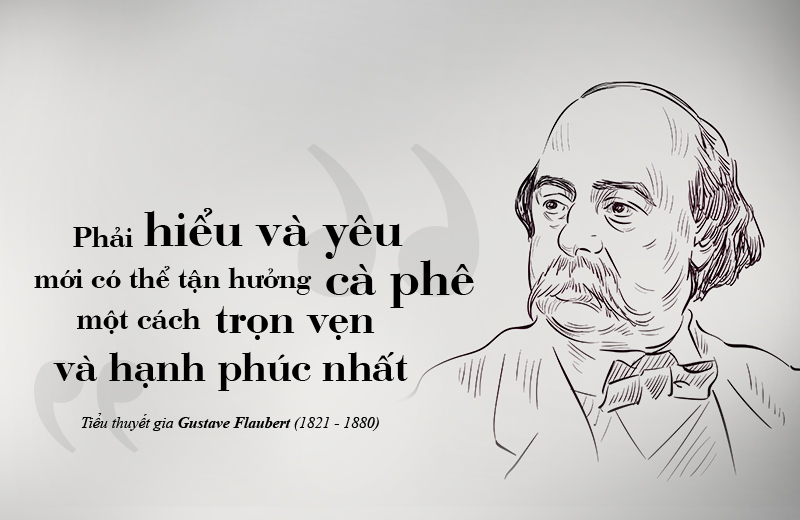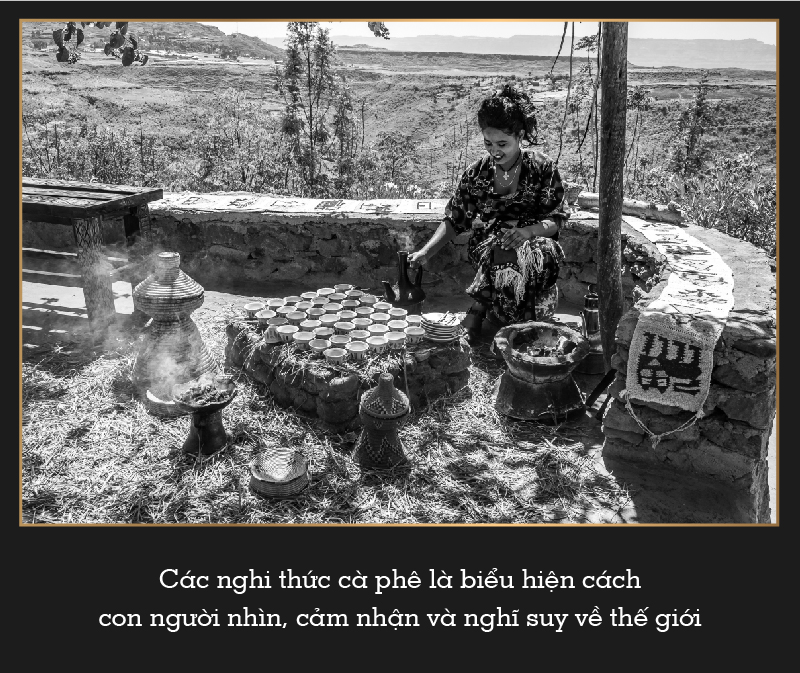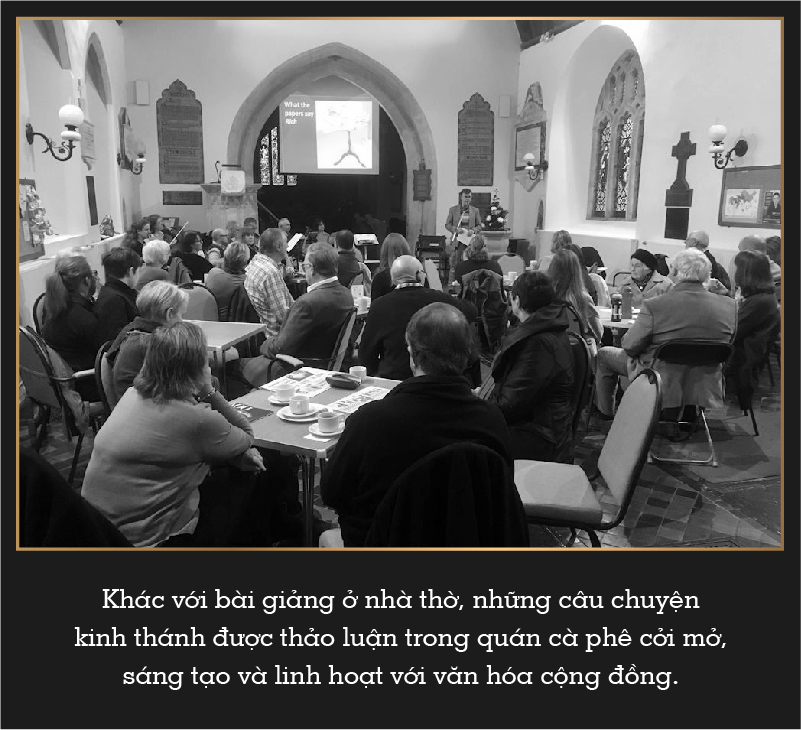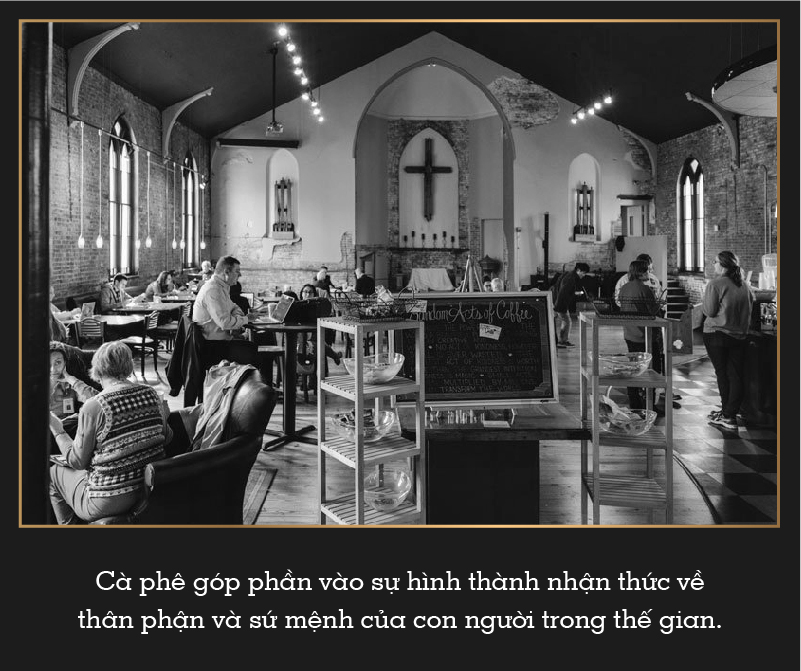Article 73: Coffee in the mythical mind
In many faiths, coffee is considered a blessing from the supernatural world sown on earth to encourage people to wake up to realize the meaning of their life on earth.

“We must understand and love to be able to enjoy coffee to the fullest and happiest.” – Gustave Flaubert (1821-1880)
Coffee’s journey from the beginning to spreading in all directions is closely related to faith in the Creator and the gods. Tracing back to the origin, the appearance of coffee was explained in sacred stories handed down over thousands of years.
Divine grace
Ethiopia is believed to be the first place where coffee was discovered. In this country there is still a popular legend about three men named Abol, Atona, Baraka wandering through the desert in the hope of finding God and receiving manna (food). When they were almost starving to death, God appeared before them, offering salvation by the revelation of drinking coffee water and chewing the leaves of the qat tree. After following the practice, their hunger disappeared. From this story, the three rounds of coffee enjoyment in the Ethiopian coffee ritual have been named Abol, Atona and Baraka. In it, the first two rounds are spiritual purification, spiritual transformation, the third round – Baraka symbolizes blessing.

Coffee rituals are expressions of how people see, feel, and think about the world.
The Oromo people, who make up more than a third of Ethiopia’s population, believe that the first coffee tree sprouted from the tears of the Waaqa (God). Therefore, coffee is a core part of all religious practices related to the life cycle of an Oromo from birth, naming, adulthood, marriage, and death. When performing the ritual, they offer coffee and pray to Waaqa for protection and blessings. One prominent ritual that is still performed today is the Buna Qalaa. During the Buna Qalaa ritual, the coffee cherries are washed, peeled and roasted with butter. Coffee and milk are then put into the waciitii pot to continue cooking. At the end of the ceremony, the attendees will drink coffee together and enjoy the blessing. Besides, according to Oromo tradition, drinking from the same waciitii is a sign of unity in love and peace.
In an ancient chronicle, the physician Sheik Omar – a healer through meditation and prayer – was exiled to Arabia. Here, exhausted and hungry, he saw an unusually colorful bird swooping down on a coffee tree branch. Sheik Omar immediately ate the fruit and became miraculously healthy. He studied how to make a decoction from coffee to survive. Sheik Omar also used coffee as medicine for many other people. He was welcomed back to his hometown of Mocha and continued to make healing coffee his way. Coffee was hailed as a panacea, Omar was made a saint and has his own monastery in his honor. This was also one of the reasons why coffee appeared in the midnight prayer meditation ceremony in Sufism monasteries.
Awakening to innovate life
Around the middle of the 13th century, Muslim Sufism spread coffee drinking throughout the Muslim world. Coffee kept parishioners awake and energized during the nights of Dhikr practice. They call that state “marqaha” – an Arabic word that means “enlightened bliss”. Dhikr is a ritual of meditation (Islamic called Murāqabah) and recollection, the purpose of which is to achieve a sense of samadhi, detachment from worldly values, and strengthen faith. Sufism Muslims practice the Dhikr ritual to return to God. Sufism mystics say that drinking coffee and praying with devotion can lead to the experience of “Qahwat al-Sufiyya,” which translates to “seeing the hidden mysteries and attaining the great revelations”. When that spiritual state is completed, man returns to his existence and fulfills the assigned tasks.
In the early 17th century, coffee was introduced to Europe and appeared in Rome, Christians called the drink from the Muslim world the “devil’s drink”. They denounced and called for a ban on the use of coffee. Before making his decision, Pope Clement VIII (1536–1605) took a sip of the coffee and happily announced, “This drink is so delicious that it would be a pity to let the infidels have exclusive use of it. We will baptize it and make it a Catholic drink.” After the baptism, coffee was widely accepted and popularized in Europe, and was also loved by Christians.

Unlike the sermon at the church, the biblical stories discussed in the cafe are open, creative and flexible with the community culture.
Catholics serve God through worship and service to the will. So it is not too difficult to understand that many cafes run by Catholics have served in a way that shows obedience to God. A network of cafes built by churches and acting as a community place for Catholics. In addition, through talks, art performances, and skill development, believers spread their faith to other communities in the area.
Some famous church cafes such as The Vaults & Garden Café located on the campus of St Mary the Virgin Church in Oxford (England) serve coffee and organize events promoting healthy lifestyles. The Loft cafe built by Alamo Heights United Methodist Church in Texas (USA) is one of the core ministries of the church community. The faithful come to The Loft to study the Bible and pastors also come to share Bible lessons or participate in periodic charity events.

Coffee contributes to the formation of awareness about the identity and mission of man in the world.
Located in Washington (USA), Ebenezer’s Coffeehouse run by the National Community Church and Potters House of Christ the Savior Church are places where believers in the community meet and find refuge in their faith. Glebe Café Church in New South Wales (Australia) and One World Coffeehouse of the Unitarian Universalist Congregation of Columbia provide an equal and compassionate space, regardless of spiritual path, where everyone can express their faith and one’s own way of worshiping… The common point of church cafes is to create an environment that supports spiritual development and encourages one’s pursuit of the meaning of life. Thereby, creating positive changes in the community and the world.
Coffee originated as a drink of searching for the “divine being”. The beliefs that accompany coffee are nothing more than a human expression of things which they admire and believe in. And with the ability to bring about awakening, coffee has awakened the extraordinary desires of people, to constantly commit themselves to serving life.
THE REAL COFFEE
ROASTED ONLY FOR PEOPLE OF WISDOM!
Source: “The Philosophical Way of Coffee” – copyright by Trung Nguyen Legend


